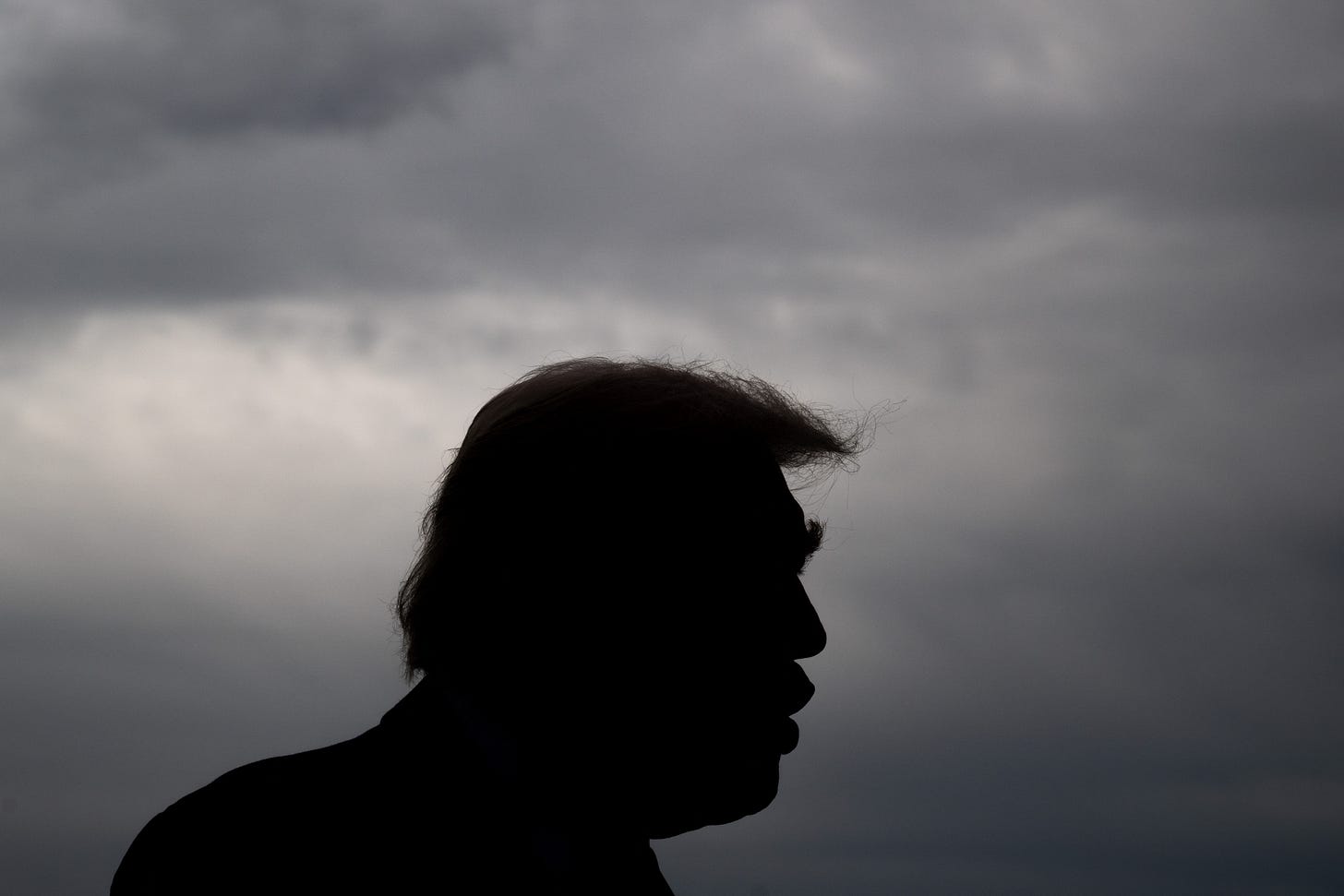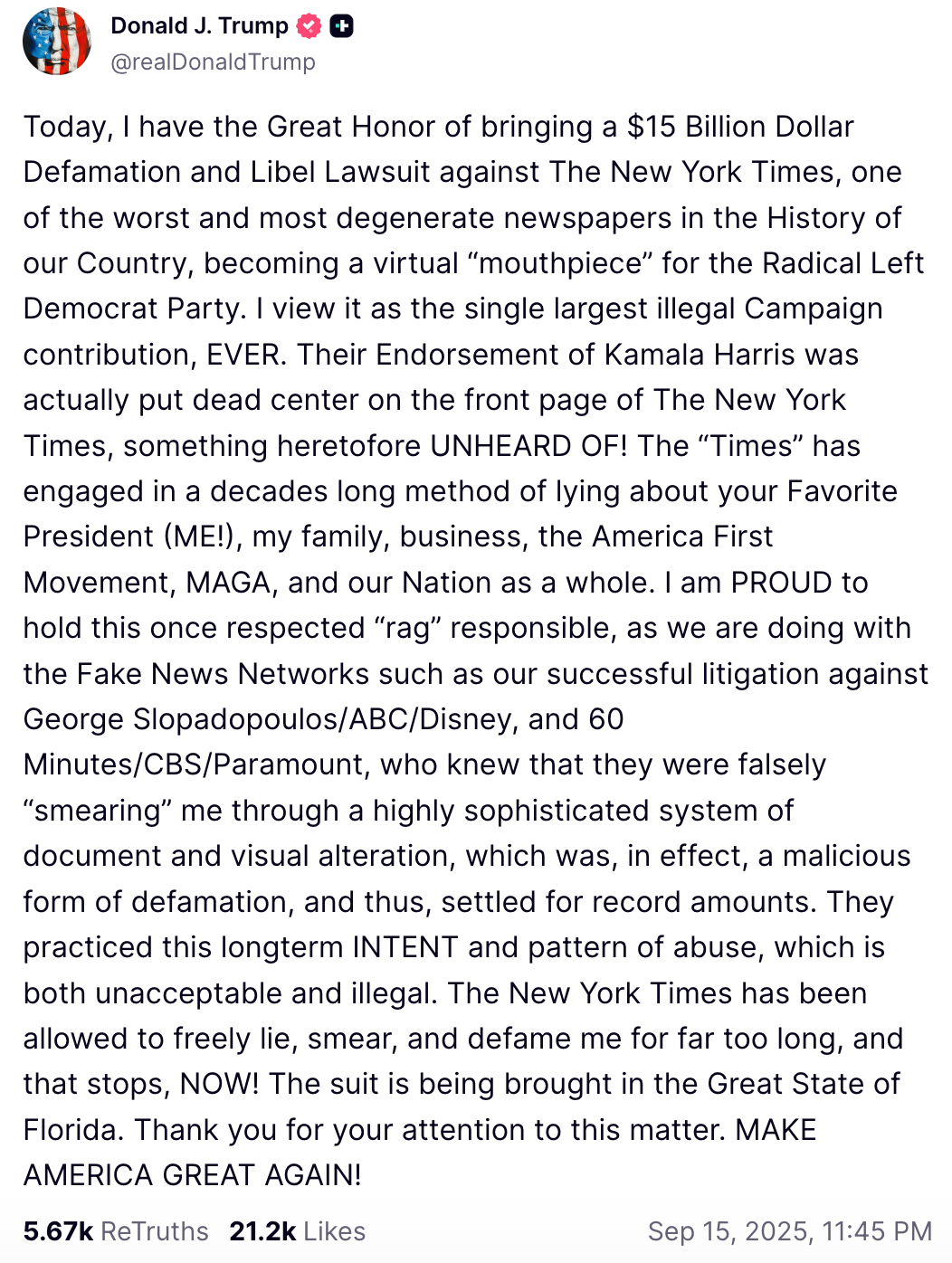Trump tries to stick up The New York Times with a water gun
The lawsuit is beyond parody, even by Trump's standards.
PN is supported by paid subscribers. Become one ⬇️
Yesterday, the world’s most famous mugger leapt out from the digital bushes and demanded $15 billion from The Gray Lady.
After successfully leveraging his official position to squeeze millions of dollars out of CBS and ABC, Trump has now turned his sights on the paper of record. Or, as he blustered on Truth Social, “The New York Times has been allowed to freely lie, smear, and defame me for far too long, and that stops, NOW!”
But the president files a lot of lawsuits, and most of them come to absolutely nothing.
Trump has recently sued CNN, the Washington Post, Simon and Schuster, New York Attorney General Letitia James, E. Jean Carroll, the Des Moines Register, and the Wall Street Journal. He once sued dozens of people. including Hillary Clinton, James Comey, and Trump’s own deputy attorney general Rod Rosenstein, for doing THE RICO to him. That case got him a million dollars in sanctions, with the judge calling out Trump’s “deliberate use of a frivolous lawsuit for an improper purpose” as part of a “playbook” that includes “provocative and boastful rhetoric,” “attacks on political opponents and the news media,” and “disregard for legal principles and precedent.”
But even by those debased standards, the suit against the Times is exceptionally ridiculous.
Baghdad Bob would blush
The complaint begins by congratulating Trump for winning the 2024 election, “the greatest personal and political achievement in American history.” It estimates the value of his “one-of-a-kind, unprecedented personal brand” at more than $100,000,000,000. It lists his “hundreds of history-making media appearances” including WrestleMania V, Home Alone 2, and a cameo on the soap opera All My Children.
Having established the plaintiff’s bona fides, the complaint goes on to call the New York Times “a full-throated mouthpiece of the Democrat Party” whose “editorial routine is now one of industrial-scale defamation and libel against political opponents.” As evidence, Trump points to the paper’s “deranged endorsement of Kamala Harris,” as well as an opinion piece from 2021 calling for an end to the Senate filibuster — something Trump himself has also demanded.
In fact, most of the supposedly defamatory allegations come from the book “Lucky Loser: How Donald Trump Squandered His Father's Fortune and Created the Illusion of Success,” written by Times reporters Russ Buettner and Susanne Craig. But while Buettner and Craig, along with their publisher Penguin Random House, are named defendants, the lawsuit functions mainly as a vehicle for Trump to vent his spleen at The Times.
“As a willing accomplice in the Russia Collusion Hoax, the Times knowingly spread falsehoods calculated to undermine President Trump’s historic victory in the 2016 presidential election and to delegitimize his presidency,” it whines.
“Lucky Loser”
The book “Lucky Loser” and the related Times articles document Trump’s “fake-it-til-you-make-it” rise to power, his obsession with style over substance, and multiple fortuitous rescues from self-inflicted ruin.
One article opens with producers for “The Apprentice” arriving at Trump Tower in Manhattan to find “a musty carpet odor that followed them like an invisible cloud,” chipped furniture, and a CEO’s desk which “bore no evidence of work, no computer screens or piles of contracts and blueprints, just a blanket of news articles focused on one subject: himself.”
These statements are defamatory, Trump insists, because readers would have understood them to suggest “specific flaws with Trump Tower” and “that President Trump did not actively participate in his businesses.” Whether it’s defamatory to suggest that someone had a messy desk and battered furniture three decades ago is an open question. But Trump is a public figure, so he’ll have to prove more than that the reporting was false and damaging.
Under the landmark Supreme Court case New York Times v. Sullivan, defamation of a public figure requires “actual malice,” defined as proof that the speaker either knew that that the statement was false, or spoke with reckless disregard for the truth. Trump simply states in conclusory fashion that the authors “knew that Trump Tower in general, and in particular the office on the twenty-sixth floor, were in excellent condition and had no such defects.”
No evidence is presented to prove this supposed knowledge. And in fact, the article quotes multiple sources, including producer Bill Pruitt, who said “when you go into the office and you’re hearing ‘billionaire,’ even ‘recovering billionaire,’ you don’t expect to see chipped furniture, you don’t expect to smell carpet that needs to be refreshed in the worst, worst way.” Another producer, Alan Blum, said it was “absurd” to think that highly qualified job applicants would humiliate themselves for the opportunity to work in such a dump.
Trump insists that his name is “synonymous not only with New York City real estate but also with worldwide excellence, luxury, and opulence.” He’s clearly very sensitive about the suggestion that executive producer Mark Burnett had to “reinvent” him, burnishing his image to make him seem more successful, polished, and hardworking than he was.
“Only President Trump had the necessary combination of actual business achievement, charisma, fame, personality, intellect, and instinctual comfort in front of a television audience that could drive the show to television heights,” he protests peevishly, adding that “in truth, President Trump was the only man who could have delivered the results that Burnett and NBC sought.”
Trump is also spitting mad about Craig and Buettner’s meticulous reporting on his family’s crooked business practices, based on years of tax returns provided by his niece Mary Trump. In original reporting in 2018, they documented the sham company Fred Trump used in the 1990s to pad maintenance bills, funnel cash to his kids, and justify hiking the rent in his rent-controlled apartments. These allegations reappear in the 2024 book as further evidence that Trump’s success is thanks to “lucky” infusions of cash from his dad, rather than his own business acumen. And Craig and Buettner are hardly the first journalists to note this luck; the Wall Street Journal reported in 1991 that Fred bought $3 million of chips at one of Trump’s casinos to save his son from defaulting on a bond payment.
Notably, Trump doesn’t deny the nitty-gritty allegations about the padded invoice scheme. Instead he objects to the general statement that Fred Trump built the family fortune off of “government programs designed to ease the pain caused by the Great Depression and World War II,” and “wrung millions of additional dollars from those programs by twisting the rules.” But even if those statements were false, they wouldn’t be defamatory — or at least not against Trump, since you can’t sue to vindicate defamation against someone else.
Sue, sue, and sue some more
Back in 2018, Trump got his lawyer Charles Harder to threaten the Times over the original reporting.
“Should The Times state or imply that President Trump participated in fraud, tax evasion or any other crime, it will be exposing itself to substantial liability and damages for defamation,” he said in a statement included in the piece itself.
But Trump didn’t sue the Times for defamation in 2018. Instead he waited until 2021 and filed a complaint in New York state court against Craig, Buettner, Mary Trump, and the paper, alleging tortious interference with the confidentiality agreement Mary signed in the litigation over her grandfather’s will. And Charles Harder, who represented Hulk Hogan in the defamation suit that destroyed Gawker, had nothing to do with it. Instead, Trump was represented by his trusty sidekick Alina Habba, the lawyer who filed the RICO suit that got him sanctioned in Florida.
The judge in New York dismissed the case against the Times (although not against Mary). He ordered Trump to pay almost $400,000 of the paper’s legal fees under the state’s anti-SLAPP law, which was enacted at least in part as a response to Trump’s use of litigation to intimidate the media and chill free speech.
But Trump has never minded much about winning in court. After losing a defamation suit against Timothy O’Brien, author of the book "TrumpNation: The Art of Being The Donald," Trump expressed no regrets: “I spent a couple of bucks on legal fees, and they spent a whole lot more. I did it to make his life miserable, which I’m happy about.”
And so, when Craig and Buettner republished the story of Trump’s family money in their 2024 book, Trump decided to go back for another round — only stupider.
“This is a stunningly pathological lawsuit even by Trumpian standards” former prosecutor Ken White joked on Bluesky. “It reads as if he was holding a gun to the head of the child of the lawyer drafting it.”
If so, Trump has been holding that gun for a long time. The case was filed by lawyers Alejandro Brito, Edward Paltzik, and Daniel Epstein — all three of whom have signed on to multiple Trump trollsuits.
Brito is the mastermind behind Trump’s defamation suit against the Journal for publishing the Jeffrey Epstein birthday poem. Paltzik is currently pratfalling all over Iowa in a doomed effort to claim that the Des Moines Register’s botched presidential poll amounts to consumer fraud. And Daniel Epstein threatened to sue the DOJ on Trump’s behalf for illegally “raiding” Mar-a-Lago — pursuant to a judicially authorized warrant — in the stolen documents case.
Here, they’ve barely bothered to make a coherent legal argument. The complaint boasts about Trump’s unparalleled success, directly undercutting his claim to have been damaged to the tune of $15 billion. It’s not defamatory to say that “Good things happened to Donald Trump. He did not earn most of those good things.” And the actual malice standard requires more than saying that the Times “hates” Trump.
This is not law:
Defendants each desire for President Trump fail politically and financially. Each feels actual malice towards President Trump in the colloquial sense: that is, each — Craig, Buettner, Baker, and Schmidt, as individuals, and the Times and Penguin’s relevant executives as corporations — subjectively wishes to harm President Trump, and each wish to manipulate public opinion to President Trump’s disadvantage to worsen his current and future political and economic prospects. Put bluntly, Defendants baselessly hate President Trump in a deranged way.
It’s a performative stunt in hopes of bullying the paper into giving Trump more favorable coverage and possibly shaking loose a few dollars.
But unlike CBS, which needed the Trump administration’s blessing for its parent company Paramount’s $8 billion merger with Skydance, the Times has a lot fewer pain points for the government to leverage. If the CBS lawsuit was the functional equivalent of a gun inside a brown paper bag, this complaint is just the bag. And this time the victim has a pretty strong incentive not to give the mugger his wallet.
“This lawsuit has no merit. It lacks any legitimate legal claims and instead is an attempt to stifle and discourage independent reporting,” the paper said in a statement yesterday. “The New York Times will not be deterred by intimidation tactics.”
The Times, which established the actual malice standard, is unlikely to sacrifice its journalistic credibility because of a laughably tenuous lawsuit and a few mean social media posts. But if Donald Trump wants to let the paper’s team of top-notch First Amendment lawyers depose Mark Burnett, who has dutifully kept his mouth shut about Trump for the past decade, who are we to complain?
That’s it for today
We’ll be back with more tomorrow. If you appreciate today’s PN, please do your part to keep us free by signing up for a paid subscription.
Thanks for reading, and for your support.








This is such an abuse of the legal process the law societies need to take strong action. Trump can afford all manner of legal fees and losses but if lawyers got the message they could lose their bar lisence by putting up pathetically weak documents in a clearly vexatious manner I reckon this might stop.
A $15B lawsuit over speech?
This isn’t about defamation, it’s about domination.
When power fears scrutiny, it sues silence.
I write today about the history of speech, Mill’s fragile ideals, and how language becomes the first casualty when truth threatens power.
Thank you for this.